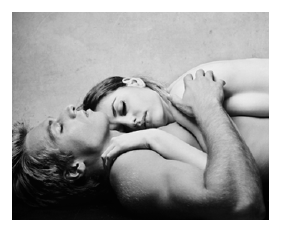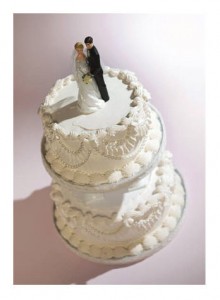Here’s a radical thought: Marital status is irrelevant.
 Or more specifically, the distinctions of single, engaged, married, separated – these are meaningless when it comes to ascertaining real commitment.
Or more specifically, the distinctions of single, engaged, married, separated – these are meaningless when it comes to ascertaining real commitment.
They’re labels we assign to ourselves or others, making assumptions about lifestyle and relationship. We use these terms to impute status, to ascertain approachability, to build ourselves up – or possibly knock others down.
So what if we tried something else?
“I love John.”
“I live with Leslie.”
“I parent with Alice.”
Don’t these statements tell us more? Or does what we say depend on context?
Boyfriend, Girlfriend, Lover, Spouse
Musing at Good Men Project in “I’d Rather Have a Man Friend Than a Boy Friend,” still struggling to find a term that works for the contemporary relationship, it is in the comments that I find a glimmer of enlightenment.
I may be pondering the inadequacy of language to capture proper terms for our unmarried partners, but what I’m increasingly seeing is our cultural unwillingness to admit to flaws in the Spousal System. And to some degree, that we really shouldn’t care.
Frankly, if I’m married or not – what possible difference does it make in the long run?
If you’re going to hit on me, I’m either “taken” in my heart (and my behavior) – or I’m not.
So is saying you’re married a meaningless gesture, if you know you’re going to sleep with the woman you’re chatting up at the bar? Maybe you’ll claim to be separated instead. Or maybe you’ll use marital status as a means to maintain boundaries – a one-night stand, but no more.
Or perhaps you prefer to claim – or remain – “single?”
Dude? Partner? “My Everything?”
I’m not suggesting commitment has no meaning. But nor have I ever found sense in “The One,” the person who “Completes Me,” or someone put in the untenable position of being “My Everything.”
Absolutely.
A trusted friend?
Certainly.
Family – in the most connective way?
I hope so.
But those romantic notions of all-encompassing love relationships?
They set us up for disappointment, put the relationship under untenable pressure, and over time, undermine our sense of self.
Hey Dude! Let’s Partner!
I don’t like the word boyfriend. Not for myself, and not at this stage.
Alternatives suggested at Good Men Project?
Use “dude” says one person, and I have to chuckle.
“…Use the word partner to describe any relationship” says another, though it seems too generic. But while smiling at Dude and evaluating Partner, I wonder if both don’t lead to a related discussion.
Dude could be the latest boy toy, your best friend, the guy you hang with from Wednesday night French class. Partner could be a colleague in a new venture, your same-sex Wish It Were Legal spouse, or your Heart Throb for the past four months.
When do we use the distinctions of “husband” and “wife” in conversation anyway? Isn’t it when first meeting someone, or in response to a question being being sized up as Solid Citizen, Carpool Consort, or Next Sexual Conquest?
Given how many married people commit infidelity – and how frequently non-marrieds do likewise – I ask again: Are relationship labels meaningless?
Language Reflects Culture
The most thought-provoking response in the GMP discussion?
It was this:
This is truly a case where the language has not kept up with the culture. I can’t think of a single descriptor that has the right connotation. As I think more about it, most of the words we use for more-than-friend relationships don’t actually imply much about the qualities of the relationship… You have dating (assessing…), engagement (more serious with respect to commitment), married (committed) and divorced (de-committed).
Ironically, the word lover, scandalous in some eyes, is probably the only genuinely descriptive word in the bunch. Apparently we don’t care about the quality of the relationship as much as we care that the relationship be binding.
Shall I rest my case right there, so ably made by a discerning reader?
Marital Status – A Matter of Intent?
Sure, you could tell me that when you stand up before a judge, your family, your version of gods – the sacred nature and solemnity of your commitment goes beyond the live-in mate. And I get it. I’ve been there. I took those vows with every ounce of belief in my body.
 Marriage concerns intent to form a family unit with another person. It implies that you will weather storms together, support each other, and you state your willingness to do so not only in public, but reinforce it with legalities. I may buy the marriage business in theory, and appreciate its potential breadth and beauty.
Marriage concerns intent to form a family unit with another person. It implies that you will weather storms together, support each other, and you state your willingness to do so not only in public, but reinforce it with legalities. I may buy the marriage business in theory, and appreciate its potential breadth and beauty.
But I ask myself: Has marriage become little more than a societal stamp of approval on a living arrangement – good or bad? Doesn’t it frequently neuter our women, perhaps more than it neuters our men?
When I think how quickly we are encouraged to wed – you know, those next logical steps after six months or a year of dating – I realize the risk we take when we don’t take our time.
Half of us get lucky. Half of us don’t.
Labels for Love?
So what if we stopped forcing the labels? What if we cooled it on placing each other in Assumption Boxes? They’re useful boxes, certainly – for guessing at like pursuits, possible availability, and even lifestyle.
But what if we thought about quality of relationship, and worried less about what we name it?
What if “partner” – for all its lack of precision – is more authentic and helpful exactly because it is imprecise?
I’m curious –
- Do you automatically ask someone’s marital status on meeting?
- If so, do you know why?
- Do you size them up as a result – for a multitude of purposes?
You May Also Enjoy

I’m 41, and I live with my …. I am too old to have a boyfriend. I have used the term “partner”, but in today’s lexicon, people first assume that I’m a lesbian. Not that there is anything wrong with that, it simply doesn’t describe me. I do like the idea of “dude” as a term. Overall, I do agree with your premise that we shouldn’t have to put a label on it.
I don’t ask someone’s martial status at a first meeting. I don’t care. I am much more interested in learning about that person’s thoughts than if she or he is in a committed relationship. There is so much more to life than that.
I think people feel if you were married you can commit. Also there is a saying, it is better to have been married and divorced than ever married at all. I also think people feel if a man hasn’t been married by 40ish he might not be marrying type. Not sure for women. I know so many wonderful women who once married and vowed to never marry again. Divorce says a lot more than single, I think.
Even though I tell myself that I don’t really care about what others think of us, in some circles, I do feel a little more self-conscious about my unmarried status. Like my very traditional family back in Malaysia, for example, or my last workplace, where most people come from the burbs with the house and the white picket fence. It’s not that I’m uncomfortable about calling him my partner, but it’s more that they can’t bring themselves to refer to him as that.
I think people gravitate towards that with which they’re comfortable, and marriage is familiar, so the rest of us who choose to live outside the rubric and who don’t fall under a neatly categorized relationship status, are generally viewed with skepticism, as if we’re not as serious or committed in our relationship because we chose not to go through the rigmarole of marriage.
And I love what that commenter said about language not keeping up with the changing culture – I really think we need to change that. I mean, people coin words and terms every day so why not find one that many of us can get behind and make a campaign out of it? If language hasn’t caught up, perhaps we should help it along?
If labels are slowly losing their meaning then perhaps that campaign is irrelevant. However, I think marriage – good or bad – will still have the monopoly on people’s perceptions on the strength of someone’s bond for a long time to come. Sadly.
I agree, Justine. Would that we could coin something that feels more fitting – or toss the need to qualify who we’re with, much less justify.
It is the assumptions about the nature / commitment inherent in marriage that are often askew in my opinion. We have them before we marry; the rest of the world (peeking in) may carry them after, as we may, ourselves.
It’s certainly more difficult to untangle a marriage, but that doesn’t a marriage make… whereas, and I hardly have to tell you, a profound bond and “family” can surely be built without a piece of paper as proof.
I think the words – engaged, married, separated, divorced convey nothing about the relationship and everything about societal structures of relationships. Marriage is less about us as individuals and more about how we ‘fit’ into society’s expectations.
But that is all changing with more fluid and individual notions of how we bond to our lovers (my favorite, though only in my own head – it feels too intimate for strangers). I love the way partner takes gender (and gender norms) out of the equation but it seems to multipurpose. Hmmmm… We do need a new lexicon for our relationships. I don’t know where to start though.
Hmmm, if I can make a Frasier reference (#55: season 3, episode 5 Frasier Online), I was kind of hoping for Bad Boy and Dirty Girl. Friends and relatives might not know what to make of it but I’m certain our collective reputation will go up a notch.
If we go with “dude,” do we also go with “dudette?” Or is it unisex?
My first two marriages taught me that ‘wife’ is a four-letter word. For 13 years with Bill, I treasured having ‘a partner’, but then we got married. I will refer to him as ‘my husband’ occasionally, but I actually try not to remember that we’re married. I liked what we had and would hate for it to change. As to titles on forms, I always choose Ms. As far as I’m concerned it’s no one’s business about my marital status. I’m financially self-sufficient and that’s all that counts.
Shelley, this is a fantastically compact comment that opens up so many great lines of discussion… I hear you, on all counts.
Manfriend is more appropriate. But it sounds funny, doesn’t it? Yet in our 40s, 50s and beyond – doesn’t boyfriend come up short?
Lover? Reminds me of my mother who told me, when I divorced at 48, to “take yourself a lover.” Cracked me up. But she meant it. Yay mom.
You know what part I don’t like about remarrying? That I changed my last name. Again. I was hesitant. It meant a lot to my husband. So I did. So I’ve had 3 last names in my lifetime. And our name is a part of who we are. Why is it men are never asked to do the same? Or expected?
I still question myself about that. Too often, too accommodating.
That “accommodating” issue, Barbara. Do you think younger women do that less? I’m all for compromising, but compromising on one’s name is pretty hard core. I did it once and regretted it. Can’t imagine doing it again.
Men aren’t expected to do the same. Quite right. Remember 20+ years ago when there was a hyphenated last name rage? I wonder how many men actually legally changed their names for that…
Is the expectation that women change their name a convention for getting them to stay in a set of boxes built around their husbands? I think so…..
I also think that at one time we would have readily admitted it, because the convention was so…..conventional. Now, it would be too embarrassing to admit that this artifact is still standard practice.
I don’t normally ask someone’s marital status. Usually people start talking: “my hubs this, my wife that, my bf/gf this” so it’s as if THEY want to establish that they’re part of a relationship. Not me. I’m married, but I don’t like to say I was divorced and now re-married. Sometimes I say Husband #1 and Husband #2 to be funny and irreverent (I hope), but my present hubs is gone so much that I am single 50% of the time, so I’m what’s referred to as a “grass widow”. It’s all the benefits of being married without actually having to see him very often. (just a joke).
Boy do I understand, Enchanted Seashells. I’m all for marriage for those who are happy with it, but you do wonder sometimes about those who can’t get through a conversation without mentioning their spouse or BF/GF… You wonder if it’s indirectly to assert a certain (exclusive?) status?
I do recall my mother’s use of the term “golf widow” for years… 🙂
I don’t usually ask someone’s marital status. I do refer to my husband all of the time – just because he is such an integral part of my life that it just seems natural to refer to him. I don’t think it gives anyone any special status, except maybe for tax purposes.
And when my tugboat man (I actually like that better than “husband”) is back, I’m a “surf widow” which is a lot like a “golf widow”. Oh well. I love reading your blog, btw. Very nicely done. My son is managing editor of a division of a new literary blog that will be launching soon–I’m sure I’ll be yelling and screaming all about it once I’m given the OK. He’s currently a Yale prof, too. Just had to slip that in.:)
Slip in anything you’d like, Enchanted Seashells. You sound like a proud mom. (We’re Proud Parent Approved around here…)
I don’t really care what someone’s marital status is unless they are making advances. I have rules, even though some people do not.
Barb – as for name change, it is an old custom. Another old custom is when a guy marries into a prominent family and takes the wife’s name (kooky). In Quebec I am told that women do not change their name because there is a cost/tax. (kooky again)
Hi DA,
No I don’t ask about marital status because the fact that a woman is married was never a reason for me not to be her lover. And this just on these grounds: If she wants me for lover it means that she wants from me something that her husband is not capable of giving her.
Now more seriously, I would want to say that not only I back up all that you say but I would want to bring it a step farther.
I think that the mistakes that we are led to make about naming or valuing relationships are due to even more than culture and language, or at least I’d prefer to say that language is the vehicle for mythologies that we are taking for granted while they are pure illusion that they make us be in control of our freedom, or of our right to blossom on the road of our true nature.
In the first episode of Mad Men, Don Draper responds this way to a woman who tells him she didn’t married because she never fell in love. And his answer is this:
“Oh, you mean love. You mean the big lightning bolt to the heart where you can’t eat and you can’t work and you just run off and get married and make babies. The reason you haven’t felt it is because it doesn’t exist. What you call love was invented by guys like me to sell nylons.”
“Is that right?” She says. And he goes: “I’m pretty sure about it. You’re born alone, and you die alone, and this world just drops a bunch of rules on you to make you forget those facts.”
Gosh! How right he is! I realize that in my book, the references I make to love are always linked to dreams. And I know that it’s because in fact I align with what says our seductive Ad Man. This “love” that is sold to us for holy matrimonies and happiness ever after is a pure myth. And the reason it keeps on being so furiously sold to us by all these media driven by the big power men, is that they count on it so that we are “gently behaving” in the limits where we can be handled and controlled, period! 🙂